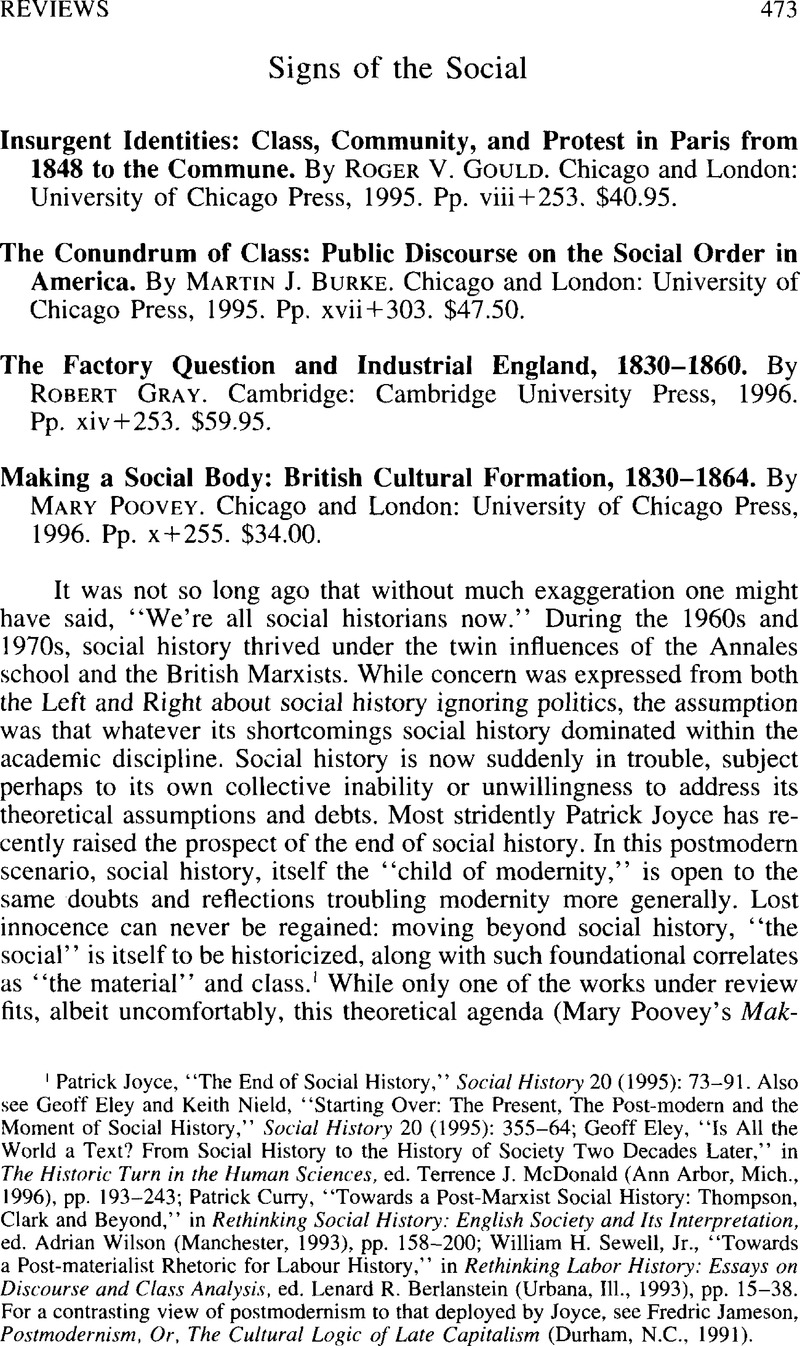No CrossRef data available.
Article contents
Signs of the Social - Insurgent Identities: Class, Community, and Protest in Paris from 1848 to the Commune. By Roger V. Gould. Chicago and London: University of Chicago Press, 1995. Pp. viii+253. $40.95. - The Conundrum of Class: Public Discourse on the Social Order in America. By Martin J. Burke. Chicago and London: University of Chicago Press, 1995. Pp. xvii+303. $47.50. - The Factory Question and Industrial England, 1830–1860. By Robert Gray. Cambridge: Cambridge University Press, 1996. Pp. xiv+253. $59.95. - Making a Social Body: British Cultural Formation, 1830–1864. By Mary Poovey. Chicago and London: University of Chicago Press, 1996. Pp. x+255. $34.00.
Published online by Cambridge University Press: 10 January 2014
Abstract

- Type
- Reviews
- Information
- Copyright
- Copyright © North American Conference of British Studies 1997
References
1 Joyce, Patrick, “The End of Social History,” Social History 20 (1995): 73–91CrossRefGoogle Scholar. Also see Eley, Geoff and Nield, Keith, “Starting Over: The Present, The Post-modern and the Moment of Social History,” Social History 20 (1995): 355–64CrossRefGoogle Scholar; Eley, Geoff, “Is All the World a Text? From Social History to the History of Society Two Decades Later,” in The Historic Turn in the Human Sciences, ed. McDonald, Terrence J. (Ann Arbor, Mich., 1996), pp. 193–243Google Scholar; Curry, Patrick, “Towards a Post-Marxist Social History: Thompson, Clark and Beyond,” in Rethinking Social History: English Society and Its Interpretation, ed. Wilson, Adrian (Manchester, 1993), pp. 158–200Google Scholar; Jr.Sewell, William H., “Towards a Post-materialist Rhetoric for Labour History,” in Rethinking Labor History: Essays on Discourse and Class Analysis, ed. Berlanstein, Lenard R. (Urbana, III., 1993), pp. 15–38Google Scholar. For a contrasting view of postmodernism to that deployed by Joyce, see Jameson, Fredric, Postmodernism, Or, The Cultural Logic of Late Capitalism (Durham, N.C., 1991)Google Scholar.
2 Jones, Gareth Stedman, Languages of Class: Studies in English Working Class History, 1832–1982 (Cambridge, 1983), p. 2Google Scholar.
3 Gould's critique is directed at Joan Scott's claim that language “not only enables social practice; it is social practice,” and her Foucauldian concept of “discourse” as encompassing “not only ways of thinking, but ways of organizing lives, institutions, societies.” Scott goes on to explain that her purpose is to resist ascribing priority to either ideas or institutions in analyzing the workings of power. See Scott, Joan, “A Reply to Criticism,” International Labor and Working-Class History 32 (1987): 40CrossRefGoogle Scholar.
4 This argument rests on Traugott, Mark, Armies of the Poor: Determinants of Working-Class Participation in the Parisian Insurrection of June 1848 (Princeton, N.J., 1985)Google Scholar, and Traugott's “organizational hypothesis.” Also see Jr.Sewell, William H., “Three Temporalities: Towards an Eventful Sociology,” in McDonald, , ed., The Historic Turn, particularly pp. 265–69 for his discussion of Traugott's workGoogle Scholar.
5 Harvey, David, Consciousness and the Urban Experience (Baltimore, 1985)Google Scholar; Lefebvre, Henri, The Production of Space, trans. Nicholson-Smith, Donald (1973; reprint, Oxford, 1991)Google Scholar; also Castells, Manuel, The City and the Grassroots (Berkeley, Calif., 1983)Google Scholar.
6 In a rather different vein see, e.g., Bennett, Tony, The Birth of the Museum: History, Theory, Politics (London, 1995)Google Scholar.
7 See Pocock, J. G. A., Virtue, Commerce, and History: Essays on Political Thought and History (Cambridge, 1985), chap. 1CrossRefGoogle Scholar, “Introduction: The State of the Art”; Tully, James, ed., Meaning and Context: Quentin Skinner and His Critics (Princeton, N.J., 1988)Google Scholar, particularly pt. 2, for Skinner's interpretation. Additionally Burke cites the influence of Begriffsgeschichte (history of concepts), for which see Richter, Melvin, “Reconstructing the History of Political Languages: Pocock, Skinner, and the Geschichtliche Grundbegriffe,” History and Theory 39 (1990): 38–70CrossRefGoogle Scholar. It is also worth comparing Burke's book to Wahrman, Dror, Imagining the Middle Class: The Political Representation of Class in Britain, c. 1780–1840 (Cambridge, 1995)CrossRefGoogle Scholar; and Thompson, James, “After the Fall: Class and Political Language in Britain, 1780–1900,” Historical Journal 39 (1996): 785–806CrossRefGoogle Scholar.
8 Spiegel, Gabrielle M., “History, Historicism, and the Social Logic of the Text in the Middle Ages,” Speculum 65 (1990): 59–86CrossRefGoogle Scholar.
9 Klingender, F. D., Art and the Industrial Revolution (1947; reprint, New York, 1968)Google Scholar. For the importance of the printed image, see Anderson, Patricia, The Printed Image and the Transformation of Popular Culture, 1790–1860 (Oxford, 1991)Google Scholar.
10 See Raymond, Williams's discussion of the “residual” in his Marxism and Literature (Oxford, 1977), chap. 8Google Scholar. Also see Poovey, 's own earlier discussion of “ideological work,” in her Uneven Developments: The Ideological Work of Gender in Mid-Victorian England (Chicago, 1988), chap. 1CrossRefGoogle Scholar; and cf. Mort, Frank, Dangerous Sexualities: Medicomoral Politics in England since 1830 (London and New York, 1987), pt. 1, “Moral Environmentalism, 1830–1860Google Scholar.”
11 LaCapra, Dominick, “History, Language, and Reading: Waiting for Crillon,” American Historical Review 100 (1995): 799–828CrossRefGoogle Scholar; Steedman, Carolyn, “Linguistic Encounters of the Fourth Kind,” Journal of Victorian Culture 1 (1996): 54–55CrossRefGoogle Scholar. For one example of how this might be done, see Scott, Joan W., Only Paradoxes to Offer: French Feminists and the Rights of Man (Cambridge, Mass., 1996)Google Scholar.
12 Also see Sewell, William H. Jr., A Rhetoric of Bourgeois Revolution: The Abbé Sièyes and What Is the Third Estate? (Durham, N.C., 1994), particularly pp. 35–38Google Scholar.




